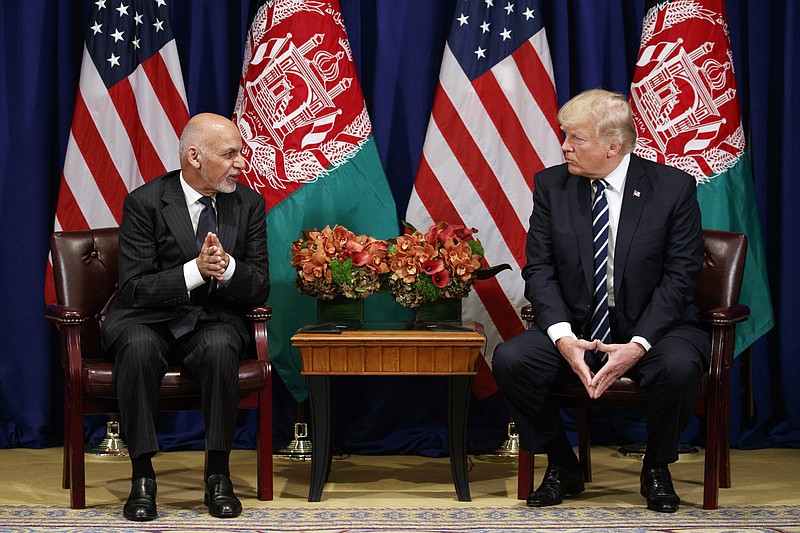NEW YORK (AP) - Abolishing militant hideouts in Pakistan is critical to establishing peace in neighboring Afghanistan, the Afghan leader said Thursday before meeting President Donald Trump on the sidelines of the U.N. General Assembly.
Neither Trump nor Afghan President Ashraf Ghani mentioned Pakistan when they appeared publicly together after their discussion. However, Ghani said Pakistan's role is an important part of the Trump plan announced last month to end America's longest war and eliminate a rising extremist threat in Afghanistan.
"Reduction of safe havens is absolutely necessary, both for counterterrorism and for stability in Afghanistan," Ghani told National Public Radio in an interview broadcast Thursday.
The Trump administration in August infuriated Pakistan by accusing it of providing haven to extremists. The U.S. also has threatened to withhold military aid from Pakistan. The country repeatedly has said it is acting against Taliban insurgents and members of the Haqqani militant group.
"I hope that this time, Pakistanis get the message loud and clear that business as usual cannot continue. It's not in their interest. It's not in anyone's interest," Ghani said.
After meeting Ghani, Trump praised efforts to try to drive members of more than 20 militant groups, including the Taliban, out of Afghanistan.
"It's really a hornet's nest from that standpoint," Trump said. "We are hitting them very, very hard and very, very effectively."
Senior officials have said Trump's plan for Afghanistan involves sending up to 3,900 additional U.S. troops on top of the roughly 8,400 Americans now in the country.
Ghani stressed Afghan forces are leading the fight and U.S. forces are advising and training. He said he isn't seeking "a blank check" of unlimited American help.
Ghani said the Trump administration's four-year objective is to bring 80 percent of the country back under the government's control. The Taliban currently hold sway in nearly half of the nation.
Separately Thursday, an independent auditor of U.S. efforts in Afghanistan released a report saying although the U.S. has spent more than $70 billion in the past 16 years to build up the Afghani security forces, they're still struggling. Problems include morale, drug use, illiteracy, corruption, poor leadership and the challenges caused by ongoing, annual rotation of U.S. advisers and trainers.
"To put it plainly, as our report does, the United States failed to understand the complexities and scale of the mission required to stand up and mentor security forces in a country suffering from 30 years of war, misrule, corruption and deep poverty," John Sopko, the congressionally appointed special inspector general, said at the Center for Strategic and International Studies in Washington.
Afghan forces are sustaining high casualties. Large swaths of the country are off-limits to foreigners. U.S. embassy personnel are mostly stuck behind the walls of the Kabul embassy. They can't train judicial and police staff or offer technical support to Afghan ministries, according to the report, which described civilian advisers "now forced to move with armed guards in convoys or even by helicopter" to meet Afghan officials.
The U.S. government is still struggling to build a security force in a nation of 70 percent illiteracy and few with technological know-how. It has trained more than 100,000 Afghan police officers using U.S. Army aviators, infantry officers and civilian contractors.
"One U.S. officer watched TV shows like 'Cops' and 'NCIS' to learn what he should teach," Sopko said. "In eastern Afghanistan, we met a U.S. Army helicopter pilot assigned to teach policing. We found one U.S. police-training unit set up as a military unit and another set up like a police unit."

